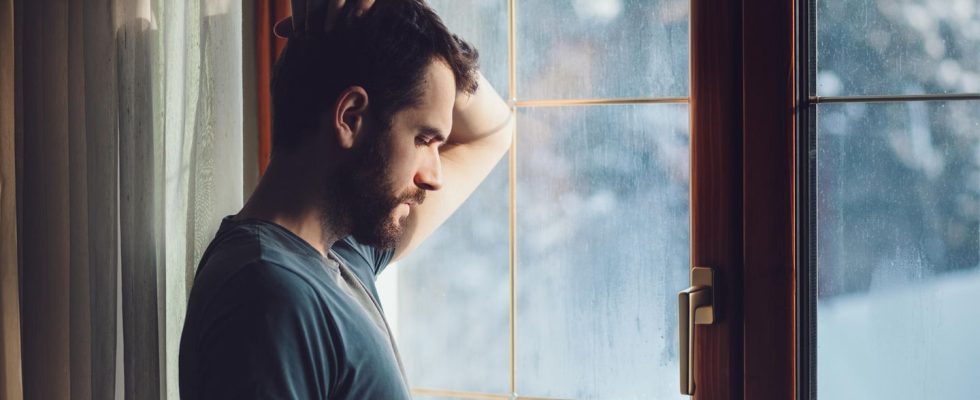International Men’s Day
“A man knows no pain”? How men deal with mental health problems today
Many men affected by mental health problems seek help late
© Marjan_Apostolovic/Getty Images
Mental health problems affect women and men equally. However, the latter often still make up for the whole thing on their own. There is now a change in thinking.
Overtired, overloaded, crushed by accumulated stress and tormented by unresolved lows: many Men in Germany have psychological problems but ignore them and do not seek help, as experts point out on International Men’s Day.
“For many people, illnesses, especially mental illnesses, are not compatible with the classic ideal of masculinity,” reports Anne-Maria Möller-Leimkuhler from the board of the Men’s Health Foundation. The orientation towards traditional masculinity norms, “i.e. being strong and successful, solving problems alone, persevering and not showing feelings,” is more pronounced among older men than among younger men. This attitude could be “very self-damaging”.
Many men have very limited access to their emotional world due to their socialization, observes the professor of social science psychiatry at the University of Munich. “They suppress and trivialize their psychological problems.” Depression in particular is often misunderstood as an expression of personal weakness and failure. Some people try to compensate with “masculine strategies,” says Möller-Leimcooler. “So more aggression and anger, more alcohol, more social withdrawal, a lot more work, a lot more sport, more risk-taking behavior and escape into the virtual world.”
Mental illnesses are anything but rare
One in four adults in Germany is affected by a mental illness within a year – around one in three women and one in four to five men, as Anette Kersting from the Clinic for Psychosomatic Medicine at the University Hospital Leipzig describes. “Men are more likely to suffer from substance abuse, i.e. dependence or abuse of alcohol and drugs.” In contrast, they are only diagnosed with depression about half as often as women. However, depression in men can sometimes be overlooked, explains the clinic director.
Möller-Leimcooler assumes that there is a high number of unreported cases and underdiagnosis, especially when it comes to depression. Unrecognized depression could have serious consequences: inability to work, social decline, isolation, anxiety disorders, diabetes, stroke, and a general increase in mortality. And: “The suicide rate for men is at least three times as high as that for women.”
Does the job play a central role?
In general, mental disorders occur regardless of profession, experts say. However, Möller-Leimkuhler points out high-risk occupational groups with a high proportion of men in which mental disorders occur more frequently than in the general population: the Bundeswehr, rescue services and also the police. Stress here can be extreme and traumatic, but at the same time traditional norms of masculinity are rather strong. The most common disorders here are post-traumatic stress disorders and depression. In general, men are much more burdened by professional stressors than women.
It’s not just their ideals that often seem to stand in men’s way. Women can recognize and name symptoms better than men, says Anette Kersting, who heads the women’s and men’s health department in the psychiatrists’ professional association DGPPN. “We see clear gender differences in the use of the health system. The offers of help are used significantly less by men.” In any case, only a minority of people with psychological problems receive therapeutic treatment – men even less often than women.
The lack of places is problematic, emphasizes psychologist Sebastian Jakobi, who advises companies on occupational safety. “Anyone who needs psychotherapy is in a weakened life situation and cannot wait many months for a place to be treated.” However, the fact that there are relatively few male therapists is less important. In any case, that is not the reason why men rarely visit a psychotherapeutic practice.
What digital offerings can achieve
In recent decades, the cliché “a man knows no pain” has lost its meaning. This tends to be the case more often with younger people than with older people, observes Jakobi, who is on the board of the freelance section of the psychologists’ professional association DGPPN. “Mindfulness, reflection, seeking and accepting help are important health skills.” There are still “important construction sites” for a significant number of men.
Even in a modern society with equal opportunities, rights and responsibilities for men and women, there are many men who place burdensome demands on themselves, for example with a view to being a provider for the family. At the same time, Jakobi sees a trend towards de-stigmatization of mental illnesses. More attention is being paid to psychological factors, diagnostics have improved, and there is also a significantly increased awareness among the medical profession.
If men who are afraid of stigmatization and won’t seek help turn to mental health apps, “that’s good, better than nothing,” says Jakobi. Advantages from their perspective could be: low-threshold, anonymous offer, easy switching between several apps. But: “It is a fallacy to think that such digital offers could replace real personal therapy with a psychotherapist.”

